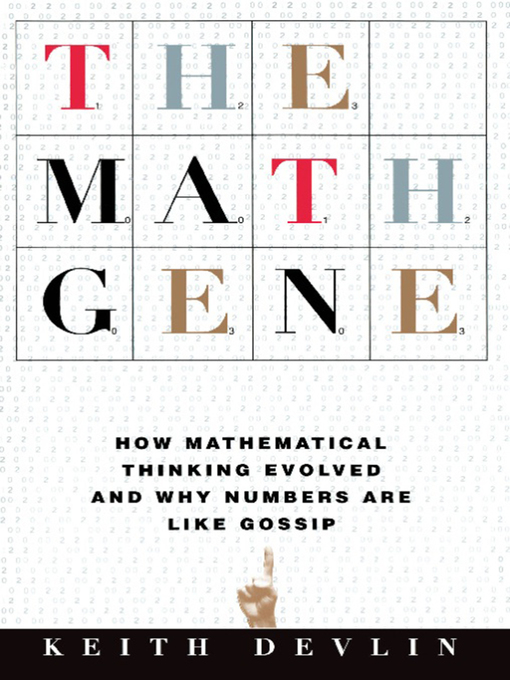The Math Gene
How Mathematical Thinking Evolved And Why Numbers Are Like Gossip
-
Creators
-
Publisher
-
Release date
May 17, 2001 -
Formats
-
Kindle Book
-
OverDrive Read
- ISBN: 9780786725083
-
EPUB ebook
- ISBN: 9780786725083
- File size: 972 KB
-
-
Languages
- English
-
Levels
- Lexile® Measure: 1230
- Text Difficulty: 9-12
-
Reviews
-
Publisher's Weekly
July 31, 2000
Recently, luminaries like Steven Pinker have shown lay audiences neat theories about how language works and how our "language instinct" evolved. In the same years, writers like David Berlinski have made higher math entertaining and accessible. Here, prolific math writer and NPR commentator Devlin (The Language of Mathematics) has joined these two strands of popular science writing. Using up-to-date cognitive psychology, along with the history of math, Devlin aims to unfold our "innate sense of number" and to show what it has to do with language. He also hopes, more ambitiously, to win readers over to his own hypothesis about how our language and math "instincts" arose. Experiments show that chimps, like us, "use symbols to denote numbers," though human toddlers are far better at it. Combining a number sense with symbolic abilities, we use abstractions to manipulate quantities, leading to arithmetic and potentially to calculus and number theory. After several stellar chapters devoted largely to psychology experiments, Devlin switches gears to higher math, giving examples of how abstract models describe concrete things--from rotating clock faces to rattlesnake skins. The book takes another sharp turn, into the stimulating but quite crowded field of hypotheses about how our brains came to be. While responsibly laying out several hypotheses, Devlin favors the idea that enhanced symbolic abilities let early hominids think "off-line," asking and answering "what if" questions about tools, predators, habitats or prey. Some may wish Devlin had written two books--one about math and language, the other about language and evolution; the former would likely ace the latter. Most readers, though, will appreciate the broad, accessible syntheses he does provide. 35 illus. -
Library Journal
August 9, 2000
This book is not about mathematics or genetics or why some people are good at math and others are not. Rather, Devlin (Goodbye, Descartes) asks and attempts to answer the question, "How and why did human beings evolve the ability to do mathematics?" His point is that mathematics is more than arithmetic. Real mathematics involves making logical arguments about abstract objects. Devlin briefly outlines Chomsky's theory that we are all born with "hard-wired" linguistic ability. He then explains that the mental process of making logical connections between abstract objects and the mental process needed to construct sentences have the identical structure. Thus, we can see that the genetic heritage that gives us all the ability to communicate by language also gives us the ability to do mathematics. I am convinced that Devlin is correct, and, if you read this book, you will be, too. For all math and science collections.--Harold D. Shane, Baruch Coll. of CUNYCopyright 2000 Library Journal, LLC Used with permission.
-
Booklist
September 15, 2000
In the same mathematical reasoning that inspired Plato with visions of eternal ideals, Devlin finds evidence for a provocative theory of evolutionary change. Unlike other scholars, who generally view the evolution of language solely as a breakthrough in communication, Devlin sees language as the surest indication of a new kind of strictly internal brain activity, one neither stimulated by the environment nor tied to physical activity. Out of this "off-line thinking" emerged not only the syntax necessary for speech, but also the symbolic logic essential to mathematics. Though its deepest structure shares an evolutionary origin shared with language, Devlin shows how math frequently calls upon a neurological number sense, naturally strong in some, weak in others. Consequently, poets may command powers of abstraction akin to those of mathematical geniuses, yet still falter in doing simple algebra. But in any manipulation of symbols, verbal or mathematical, Devlin perceives faculties that set one of the earth's creatures apart from all others. So in exploring the mysterious beginnings of the mind's symbolic powers, he takes us a long way toward understanding what it means to be human. (Reprinted with permission of Booklist, copyright 2000, American Library Association.)
-
Formats
- Kindle Book
- OverDrive Read
- EPUB ebook
subjects
Languages
- English
Levels
- Lexile® Measure:1230
- Text Difficulty:9-12
Loading
Why is availability limited?
×Availability can change throughout the month based on the library's budget. You can still place a hold on the title, and your hold will be automatically filled as soon as the title is available again.
The Kindle Book format for this title is not supported on:
×Read-along ebook
×The OverDrive Read format of this ebook has professional narration that plays while you read in your browser. Learn more here.



